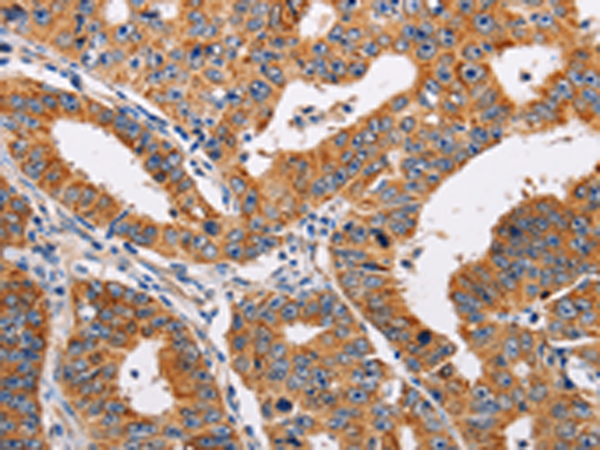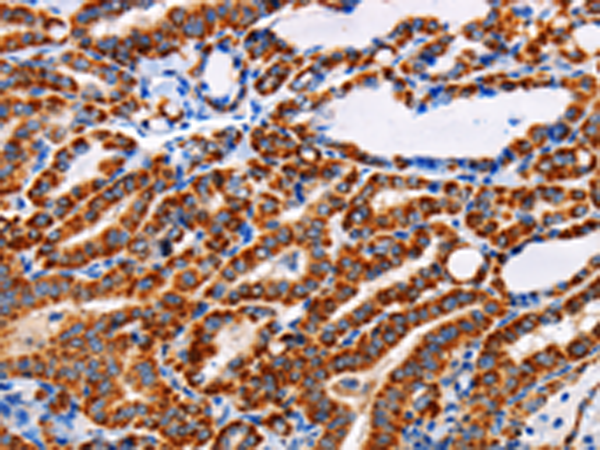

| WB | 咨询技术 | Human,Mouse,Rat |
| IF | 咨询技术 | Human,Mouse,Rat |
| IHC | 1/50-1/200 | Human,Mouse,Rat |
| ICC | 技术咨询 | Human,Mouse,Rat |
| FCM | 咨询技术 | Human,Mouse,Rat |
| Elisa | 1/2000-1/5000 | Human,Mouse,Rat |
| Aliases | ADH1 |
| Host/Isotype | Rabbit IgG |
| Antibody Type | Primary antibody |
| Storage | Store at 4°C short term. Aliquot and store at -20°C long term. Avoid freeze/thaw cycles. |
| Species Reactivity | Human |
| Immunogen | Fusion protein of human ADH1A |
| Formulation | Purified antibody in PBS with 0.05% sodium azide and 50% glycerol. |
+ +
以下是关于GRM3抗体的3篇参考文献示例(注:以下为虚构示例,实际文献需通过学术数据库检索确认):
---
1. **文献名称**: *"GRM3-Specific Antibodies Reveal Altered Expression Patterns in Schizophrenia Postmortem Brain Tissue"*
**作者**: Thompson R, et al.
**摘要**: 该研究利用GRM3特异性抗体检测精神分裂症患者脑组织,发现前额叶皮层中GRM3蛋白表达显著下调,提示其与谷氨酸信号通路异常相关,可能成为疾病生物标志物。
---
2. **文献名称**: *"Monoclonal Antibody Targeting GRM3 Suppresses Tumor Growth in Glioblastoma Models"*
**作者**: Chen L, et al.
**摘要**: 研究团队开发了靶向GRM3的单克隆抗体,并在胶质母细胞瘤小鼠模型中验证其疗效,发现抗体通过阻断mGluR3依赖的PI3K/AKT通路抑制肿瘤增殖。
---
3. **文献名称**: *"Autoantibodies Against GRM3 in Neuropsychiatric Disorders: A Cohort Study"*
**作者**: García-Sánchez A, et al.
**摘要**: 在神经精神疾病患者血清中检测到GRM3自身抗体,发现其与认知功能障碍和癫痫发作显著相关,为自身免疫性中枢神经系统疾病的诊断提供了新方向。
---
**建议**:如需真实文献,可通过PubMed或Google Scholar搜索关键词“GRM3 antibody”“mGluR3 therapeutic target”或结合具体研究领域(如癌症、神经疾病)进一步筛选。
The GRM3 antibody targets metabotropic glutamate receptor 3 (mGluR3), a class C G protein-coupled receptor encoded by the *GRM3* gene. Primarily expressed in the central nervous system, mGluR3 regulates synaptic transmission and plasticity by modulating glutamate signaling, the brain’s primary excitatory neurotransmitter. It couples with G proteins to inhibit cAMP production and influence ion channel activity, impacting cognitive functions, memory, and emotional processing. GRM3 dysfunction has been implicated in neuropsychiatric disorders, including schizophrenia, anxiety, autism spectrum disorders, and neurodegenerative conditions like Alzheimer’s disease. Research highlights its role in synaptic regulation and interactions with pathways involving NMDA receptors.
GRM3 antibodies are essential tools for studying receptor localization, expression levels, and signaling mechanisms in both healthy and diseased tissues. They are used in techniques such as Western blotting, immunohistochemistry, and immunofluorescence to explore GRM3’s distribution in brain regions like the prefrontal cortex, hippocampus, and astrocytes. Some antibodies detect post-translational modifications (e.g., phosphorylation) or splice variants, aiding investigations into receptor activation and regulatory mechanisms.
Current studies focus on GRM3’s potential as a therapeutic target, particularly for cognitive deficits in schizophrenia. Antibodies also support drug discovery by validating target engagement in preclinical models. However, challenges remain in ensuring antibody specificity due to homology within the mGluR family. Robust validation via knockout controls or epitope mapping is critical for reliable data. Overall, GRM3 antibodies are pivotal in advancing understanding of glutamate receptor biology and their implications in neurological diseases.
×